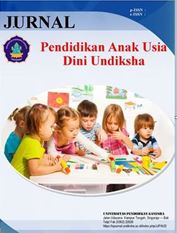PENERAPAN PERMAINAN TRADISIONAL ENGKLEK UNTUK MENGEMBANGKAN MOTORIK KASAR ANAK KELOMPOK A TK RAISMA PUTRA DENPASAR
DOI:
https://doi.org/10.23887/paud.v4i2.7611Abstract
Penelitian ini bertujuan untuk mengetahui peningkatan perkembangan motorik kasar setelah diterapkan permainan tradisional engklek pada anak Kelompok A Semester II Tahun Pelajaran 2015/2016 di TK Raisma Putra Denpasar. Jenis penelitian ini adalah penelitian tindakan kelas yang dilaksanakan dalam dua siklus. Subjek penelitian adalah 12 orang anak TK Raisma Putra Denpasar pada kelompok A semester II tahun pelajaran 2015/2016. Pengumpulan data dalam penelitian ini dilakukan dengan metode observasi dan instrumen pengumpulan data yang digunakan adalah lembar observasi. Dalam penelitian ini menggunakan metode analisis statistik deskriptif dan metode analisis statistik deskriptif kuantitatif. Hasil penelitian ini menunjukkan bahwa terdapat peningkatan perkembangan motorik kasar setelah penerapan permainan tradisional engklek pada anak kelompok A semester II tahun pelajaran 2015/2016 Di TK Raisma Putra Denpasar sebesar 13,56%. Hal ini dapat dilihat dari adanya peningkatan rata-rata persentase kemampuan perkembangan motorik kasar pada siklus I sebesar 66,62% dengan kriteria sedang menjadi sebesar 80,18% pada siklus II yang ada pada kriteria tinggi. Dengan demikian, dapat disimpulkan bahwa permainan tradisional engklek dapat meningkatkan perkembangan motorik kasar anak kelompok A Semester II Tahun Pelajaran 2015/2016 di TK Raisma Putra Denpasar.Kata Kunci : permainan tradisional engklek, perkembangan motorik kasar, anak usia dini
The study aimed to find out the development of hard motoric after the implementation of the traditional game engklek toward second semester student group A in academic year 2015/2016 at TK Raisma Putra Denpasar. The model of this study is classroom action research with two cycle. The subject of this study was 12 second semester student of group A at TK Raisma Putra Denpasar in academic year 2015/2016. The data collection in this study is done by observation method and the instrument to collect the data is observation sheet. This study used descriptive statistic analysis and descriptive quantitative statistic analysis method. The result of this study shower that there is a development of the hard motoric after the implementation of traditional game engklek toward the second semester group A students in academic year 2015/2016 at TK Raisma Putra Denpasar. The development reach 13,56%. This could be seen from the development of the average precentage of hard motoric skill development on the firts cycle, it is 66,62%, which is categorized asa average becomes 80,81% on the second cycle which can be categorized as high.
keyword : traditonal game engklek, development of hard motoric, early childhood
Published
2016-07-18
How to Cite
., N. K. A. N., ., D. I. K. N. W. M., & ., D. I. G. A. O. N. M. (2016). PENERAPAN PERMAINAN TRADISIONAL ENGKLEK UNTUK MENGEMBANGKAN MOTORIK KASAR ANAK KELOMPOK A TK RAISMA PUTRA DENPASAR . Jurnal Pendidikan Anak Usia Dini Undiksha, 4(2). https://doi.org/10.23887/paud.v4i2.7611
Issue
Section
Articles
License
Authors who publish with the Jurnal Pendidikan Anak Usia Dini Undiksha agree to the following terms:
- Authors retain copyright and grant the journal the right of first publication with the work simultaneously licensed under a Creative Commons Attribution License (CC BY-SA 4.0) that allows others to share the work with an acknowledgment of the work's authorship and initial publication in this journal.
- Authors are able to enter into separate, additional contractual arrangements for the non-exclusive distribution of the journal's published version of the work (e.g., post it to an institutional repository or publish it in a book), with an acknowledgment of its initial publication in this journal.
- Authors are permitted and encouraged to post their work online (e.g., in institutional repositories or on their website) prior to and during the submission process, as it can lead to productive exchanges, as well as earlier and greater citation of published work. (See The Effect of Open Access)












